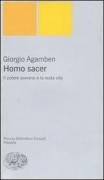Homo Sacer. Il potere sovrano e la nuda vita

Any attempt to rethink our political categories must move from the awareness that the classical distinction between zoe and bios, between natural life and political existence (or between man and man as a simple living as a political entity), we do not know anything . Archaic homo sacer in Roman law was a man that anyone could kill without committing murder and that he should not, however, be put to death in the form prescribed by the rite. It's life and be killed insacrificabile of the 'holy man' here to provide the key to a critical reading of our political tradition. When life becomes at stake, and this policy is transformed into biopolitics, all the fundamental categories of our thought, from human rights to democratic citizenship, enter into a process of evacuation and displacement is the result of which today before our eyes. Following the thread of the fundamental relationship between sovereign power and bare life, from Aristotle to Auschwitz, the corpus dall'Habeas Declarations of Rights, the book, Agamben seeks to decipher the puzzles - first of all fascism and Nazism - that our century suggested that the historical reason. Up to see the concentration camp, hidden biopolitical paradigm of modernity in which city and home have become indistinguishable and the ability to distinguish between our biological body and our body politic there has been removed once and for all.